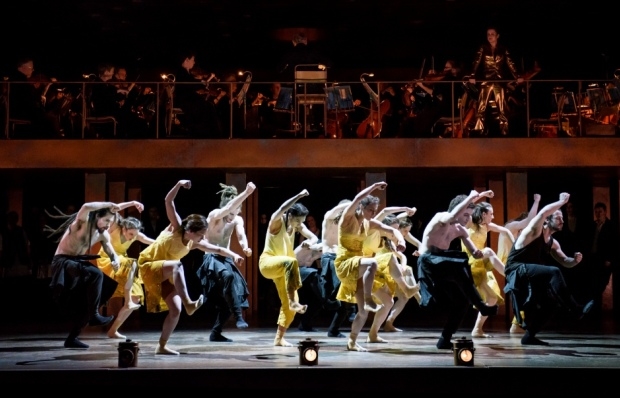Orphée et Eurydice (Royal Opera House)
Covent Garden stages Gluck’s most popular opera in its Paris version

© Bill Cooper
The comment probably arose because John Eliot Gardiner and the English Baroque Soloists spend the evening centre stage in full view. At times they're lifted up to reveal a colonnade beneath; at others they dip down into the Acheron. And Conor Murphy's hearty designs provide more than mere spectacle: they double as acoustic panels and lend immediacy to the orchestral sound.
Gluck's Paris version of Orfeo ed Eurydice allocates the leading role to a high tenor rather than the alto/mezzo of the Italian original, and in Juan Diego Flórez the Royal Opera has secured a top man for the job. But he never seems entirely at ease, probably because it's a giant of a sing. Orphée is rarely offstage for more than a few minutes and some of his arias, like the firework display of "L'espoir renaît dans mon âme", are inordinately taxing. That fresh, airy voice grew reedy during the music's elaborate lines, particularly late on, and his acting was perfunctory for the most part; yet he delivered the opera's big 11 o'clock number, "J'ai perdu mon Eurydice" ('Che faro?'/'What is life?') with all the conviction of an integrated soliloquy.
'Stylish, unfussy production'
Flórez is joined in the trio of principals by the silken soprano of Amanda Forsythe as Amour, power-dressed in a gold business suit as the celestial fixer, and by Lucy Crowe, always an impassioned singer and here a paragon of dignity until the sudden bump of her second death. ("Je meurs" — "I die" — clunk. How they laughed.)
After the technical gargantuanism of The Rise and Fall of the City of Mahagonny and a conceptually messy Così fan tutte for Garsington Opera, it's a pleasure to see John Fulljames put his name to such a stylish, unfussy production. He shares co-director credit with Hofesh Shechter, the choreographer whose dancers have so much to do in Gluck's ballet-led opera, from igniting wicker effigies of Eurydice to embodying Gluck's succession of spirits, blessed and otherwise.
Shechter's brand of terpsichory requires the sprint energy of a Red Bull addict with its non-stop welter of flailing arms, jogging on the spot, headbanging and pogo-jumping. His dancers get a proper upper-body workout; their cardiovascular systems must be hench. Not much happens below the waist, though, if you see what I mean (although, while I have your attention, it's pretty sexless too) and by the end of the opera's extended dance coda you may conclude that a little of their shake, rattle and roll goes a long way.
The singing of Gardiner's own Monteverdi Choir is as exciting as the orchestral playing, and that, together with Lee Curran's spectacular lighting, makes this a classy and fulfilling evening, for all its incidental flaws. The BBC Radio 3 broadcast on 24 October is definitely one for the diary.












